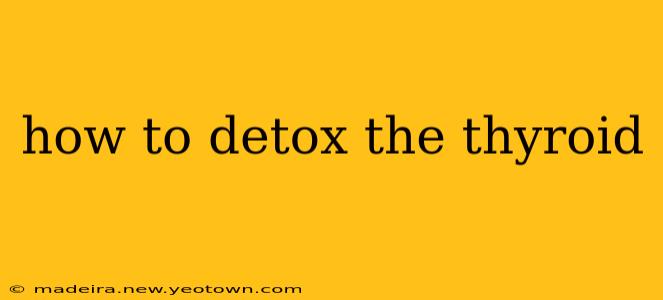The thyroid, a small but mighty gland in your neck, plays a crucial role in your overall well-being. It regulates metabolism, energy levels, and even your mood. When your thyroid isn't functioning optimally, it can lead to a range of symptoms, from fatigue and weight gain to depression and anxiety. While there's no quick "detox" for the thyroid in the traditional sense, supporting its health through a holistic approach is key. This isn't about eliminating toxins; it's about optimizing your body's natural detoxification processes and providing the thyroid with the nutrients it needs to thrive. This article explores how to nurture your thyroid's health and improve its function naturally.
What Does "Thyroid Detox" Really Mean?
Before we dive into strategies, it's important to understand that the term "thyroid detox" is somewhat misleading. Your body already has sophisticated detoxification systems in place—your liver and kidneys are constantly working to filter out harmful substances. Instead of a detox, we're focusing on supporting these systems and providing optimal conditions for your thyroid to function at its best. This holistic approach tackles the underlying causes of thyroid imbalances, rather than just addressing symptoms.
What are the common causes of thyroid problems?
Several factors can contribute to thyroid dysfunction. These include:
- Autoimmune diseases: Hashimoto's thyroiditis and Graves' disease are autoimmune disorders that attack the thyroid gland.
- Iodine deficiency or excess: Iodine is crucial for thyroid hormone production. Too little or too much can disrupt its function.
- Stress: Chronic stress significantly impacts thyroid hormone production.
- Nutrient deficiencies: Deficiencies in selenium, zinc, and vitamin D can impair thyroid function.
- Exposure to toxins: Certain environmental toxins can interfere with thyroid hormone production and metabolism.
Addressing these underlying issues is critical to supporting your thyroid health. Let's explore some ways to do this.
How Can I Support My Thyroid Naturally?
Here are some key strategies to support thyroid health:
1. Optimize Your Diet
What foods should I eat to support my thyroid? A balanced diet rich in nutrients is essential. Focus on:
- Iodine-rich foods: Seaweed, cod, and iodized salt (in moderation).
- Selenium-rich foods: Brazil nuts, tuna, and eggs.
- Zinc-rich foods: Oysters, pumpkin seeds, and lentils.
- Foods rich in Vitamin D: Fatty fish, egg yolks, and mushrooms exposed to UV light.
- Cruciferous vegetables (in moderation): Broccoli, cauliflower, kale, and cabbage contain compounds that can interfere with thyroid hormone production in some individuals. Consume them in moderation and cooked, not raw.
What foods should I avoid? Limit processed foods, refined sugars, and excessive caffeine, as these can stress the thyroid and impede its function.
2. Manage Stress
How does stress affect my thyroid? Chronic stress significantly impacts thyroid hormone production. Practice stress-reducing techniques like yoga, meditation, deep breathing exercises, and spending time in nature.
3. Prioritize Sleep
How much sleep should I get? Aim for 7-9 hours of quality sleep per night. Sufficient sleep is crucial for hormone regulation, including thyroid hormones.
4. Support Your Liver and Kidneys
How can I support my liver and kidneys' detoxification processes? A healthy liver and kidneys are crucial for removing toxins from the body. Support their function by drinking plenty of water, eating a healthy diet, and avoiding excessive alcohol consumption.
5. Consider Supplements (Under Medical Guidance)
Should I take thyroid supplements? If you have a thyroid condition, consult your doctor before taking any supplements, including those containing iodine, selenium, or zinc. They can help you determine if supplementation is necessary and the appropriate dosage.
6. Exercise Regularly
What kind of exercise is best for thyroid health? Regular exercise improves overall health and can contribute to better thyroid function. Choose activities you enjoy, whether it's walking, swimming, or yoga.
When Should I See a Doctor?
If you suspect you have a thyroid problem, it's crucial to seek medical attention. Your doctor can perform blood tests to assess your thyroid hormone levels and diagnose any underlying conditions. They can then recommend appropriate treatment, which may include medication or lifestyle changes. Remember, this article provides general information and should not be considered medical advice. Always consult a healthcare professional for personalized guidance.

